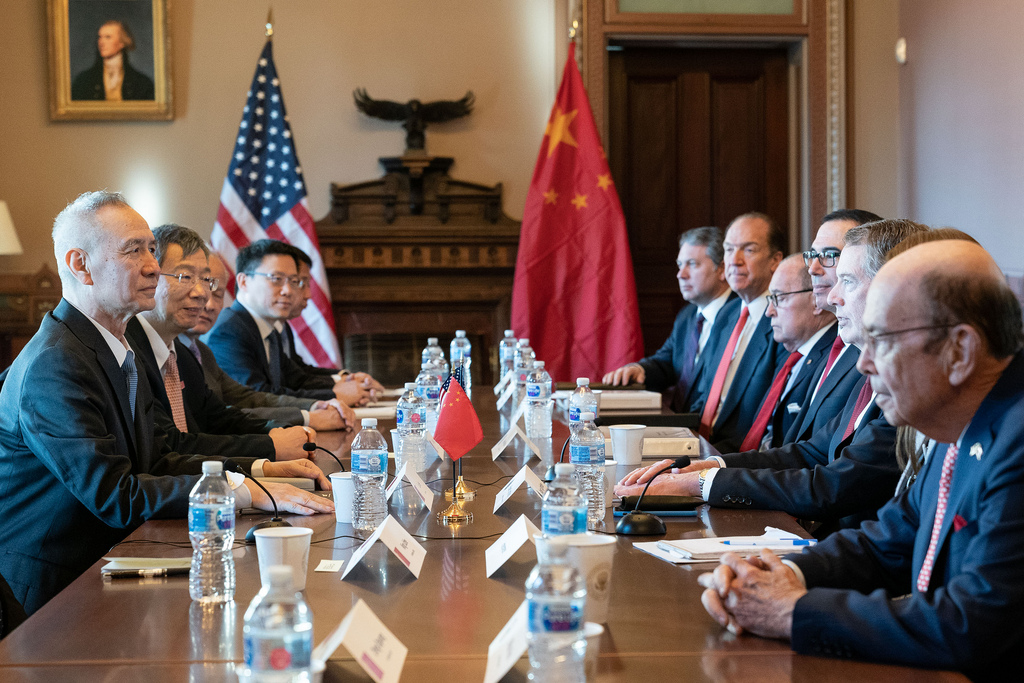SinoTech: U.S.-China Trade Talks Continue with an Emphasis on Tech
U.S. Treasury Secretary Steven Mnuchin and U.S. Trade Representative Robert Lighthizer concluded another round of trade talks with their Chinese counterparts last week in Beijing. Much of this round centered on how to handle key structural issues surrounding technology transfer and data storage.

U.S. Treasury Secretary Steven Mnuchin and U.S. Trade Representative Robert Lighthizer concluded another round of trade talks with their Chinese counterparts last week in Beijing. Much of this round centered on how to handle key structural issues surrounding technology transfer and data storage. The Chinese government’s proposals on these topics—one of the thorniest points of negotiation—were more extensive than in the past, according to Reuters.
In particular, the two sides discussed disputes arising from China’s new cybersecurity law, which went into effect in June 2017. Many foreign companies feel disadvantaged by the law and accompanying regulations. In particular, the law’s data localization and “security assessment” requirements in Article 37 have made cloud-computing activity and information storage major points of friction for U.S. companies. Many companies have either had to give up operations in China or form partnerships with a local firm. However, Premier Li Keqiang also announced potential new opportunities for foreign technology firms to enter into China’s cloud-computing market, which would allow foreign operators to provide services in China on a trial basis.
Another area of concern arises from provisions of the law under which operators of “critical information infrastructure” must undergo national security reviews and submit annual cybersecurity reports. It is unclear which entities constitute “critical information infrastructure” operators, however, and many foreign firms are unsure whether and how they are subject to these requirements. More clearly defining the status of these operators—possibly based on their share of the Chinese market—has been a topic of negotiation.
Progress has also been made in areas outside technology. On March 31, the State Council, China’s top administrative authority, announced that a three-month suspension of the 25% tariffs on American cars and auto parts would remain in place beyond the original expiry date. The decision to extend the tariff suspension follows a similar decision by the United States to put off increasing tariffs on $200 billion in Chinese imports as trade talks continued. In a further sign of goodwill, on April 1, three Chinese agencies—the Ministry of Public Security, the National Health Commission and the National Medical Products Administration—announced that all “fentanyl-related substances” would be treated as controlled substances. Fentanyl is a potent synthetic opioid, and until recently some variants remained legal in China and continued to be exported to the United States. The April 1 announcement fulfilled an agreement reached by Presidents Donald Trump and Xi Jinping at the G20 Summit in December 2018 to curb supplies of fentanyl coming from China.
The trade talks will continue this week when Vice Premier Liu He, the chief Chinese negotiator, leads a delegation to Washington beginning April 3. The two sides have indicated they hope to reach an agreement by the end of this month. Yet even if they reach an agreement, a number of questions will linger surrounding monitoring and enforcement. The Trump administration has also made clear that tariffs may remain for a “substantial period” after an agreement in order to promote compliance.
Xi Jinping Mounts Charm Offensive in Europe
Last week, President Xi Jinping concluded his first overseas trip of 2019. Xi began his tour in Italy, where he was warmly received by Prime Minister Giuseppe Conte. On March 23, Italy signed a memorandum of understanding with the Chinese government in support of the Belt and Road Initiative (BRI), China’s ambitious and global infrastructure investment campaign. Luigi di Maio, Italy’s minister of economic development, stated that “our goal … is to start to rebalance an imbalance for which there is a lot of ‘Made in China’ coming to Italy and too little ‘Made in Italy’ that goes to China.”
China and Italy also signed 29 other agreements, including two port management deals that will see state-owned enterprise China Communications Construction invest in the Italian ports of Trieste and Genoa. There may be reason, however, to temper the optimism surrounding Xi’s trip to Italy. Ilaria Maria Sala, writing for the New York Times, noted that the Italian government remains riven by disagreements on China and concluded that Rome could prove to be “an unreliable partner” for Beijing.
Xi then visited Monaco and closed out his trip in France. Prince Albert of Monaco, like Conte, pulled out all the stops for the Chinese delegation, with the palace stating that Monaco is interested in “boosting China’s image in the principality.” Monaco has already granted Huawei approval to develop its 5G telecommunications network. Yet it was in France that Xi met with the most surprising success. In recent months, France, Germany and the European Commission have evinced a willingness to criticize Chinese economic and trade policies. Just ahead of Xi’s arrival in France, the French minister for Europe and foreign affairs, Jean-Yves Le Drian, warned that a “new Silk Road … must be one that goes in both directions.” On March 26, the European Commission recommended a “common EU approach to the security of 5G networks” and urged each member state to “complete a national risk assessment of 5G network infrastructures by the end of June 2019.” The commission referenced “security threats connected with the rising Chinese technological presence in the Union.”
Elements of Western European solidarity were present during Xi’s visit too. German Chancellor Angela Merkel and European Commission President Jean-Claude Juncker joined French President Emmanuel Macron in Paris for a quadrilateral meeting with Xi. Juncker notably urged Xi to improve market access conditions for European companies working in China.
Alongside pushback against Chinese trade and investment policies, however, the Chinese delegation left France having inked 15 major commercial deals, including one that will see China purchase 300 Airbus planes. Mathieu Duchatel, director of the Asia Program at Institut Montaigne, noted that “Chinese diplomacy took Europe as it is” and argued that Xi’s visit to France, while not an unqualified success, “ended on a positive note.” Duchatel also contended that Beijing realizes that “mutual economic interests can be pursued outside the framework of the belt and road plan.”
In Other News
- The Committee on Foreign Investment in the United States (CFIUS) has expressed concern about Beijing Kunlun Tech’s ownership of the dating app Grindr, reported Reuters. Last year, Beijing Kunlun Tech indicated that it planned to organize an IPO for Grindr, which it acquired in 2016; it now appears to intend to sell the app instead. While the details of CFIUS’s worries have not been made public, they likely center around personal data held by the app. Access to personal data has become a growing focus of the committee and contributed to the foundering of Ant Financial’s plan to acquire Moneygram in January 2018.
- Meng Hongwei, the former chairman of Interpol, was expelled from the Chinese Communist Party (CCP) last week following an investigation by the party’s top anticorruption body, the Central Commission for Discipline Inspection (CCDI), in which he was accused of taking bribes, “willfully squander[ing] national assets,” and having “seriously tarnished the image of the party and seriously harmed the interests of the state.” Meng disappeared abruptly last September 2018 during a trip back to China, and Chinese authorities later told Interpol that Meng was being held as part of a corruption investigation. His wife has argued that Meng’s case is purely political and she has sought asylum in France, where Interpol is headquartered. Meng’s fall from grace was swift as he had previously served as vice minister for public security and as a member of the CCP’s Central Committee—one of China’s most powerful political bodies.
- Another high-ranking ex-Chinese official brought down on corruption charges was also in the news last week, when former head of the Cyberspace Administration of China Lu Wei was sentenced to 14 years in prison. He also received a fine of RMB 3 million ($447,000). Lu had been the face of the Chinese government’s internet regulation efforts until 2016. In November 2017, the CCDI placed him under investigation for bribery.
- Despite the political and media turmoil surrounding Chinese telecom giant Huawei in recent months, the company reported a 25% increase in its annual profit and 19.5% increase in annual revenue totaling RMB 721.2 billion ($107.13 billion) in 2018. Increased smartphone sales drove much of this growth. Consumer business now represents the company’s largest share of revenue, while revenue from its carrier network operations has remained fairly constant.
- The Financial Times reported that members of Congress, including Sen. Marco Rubio, are advocating for mandatory disclosure from Chinese companies trading in U.S. markets about their connections to the Chinese government’s security and surveillance activities. Two major public pension funds—the California State Teachers’ Retirement System and the New York State Teachers’ Retirement System—own shares in Hikvision, a company that provides surveillance equipment to “re-education” internment camps in Xinjiang. While many passively traded funds indirectly hold shares in Hikvision because it is listed on the MSCI Emerging Markets Index, some funds that once owned Hikvision shares have sold their stakes amid growing concern about human rights abuses in Xinjiang.
Commentary
Italy’s decision to sign a memorandum of understanding with China in support of the Belt and Road Initiative (BRI) led a number of commentators to focus on the initiative’s pitfalls and promises. Anthony Rowley, writing for the South China Morning Post (SCMP), warned that China is laden with “excess debt” but argued that BRI “may be the only hope for a global economic stimulus.” BRI, Rowley continued, “is about the only project now that offers any scope for increased international investment and trade.” Richard Boucher, a longtime China hand and veteran diplomat, made the case for caution, concluding that “[t]he Belt and Road makes China a player, but not the biggest nor the only new player in the game of international finance.” Regarding Europe, Boucher warned that “there are not signs that” new trade routes from China to Europe “are either economically practical or viable.”
Nadège Rolland and Brad Carson discussed BRI’s wide-ranging implications on the War on the Rocks “Jaw Jaw” podcast. Rolland argued that BRI is in part motivated by the fact that “China has traditionally been a continental power” and that “asserting … dominance over the continent makes more sense for them than becoming a Mahanian power.” Rolland and Carson both connected BRI-related issues to the topic of Chinese foreign policy more broadly. Mark Valencia, writing for the SCMP, similarly connected Chinese investment to Chinese foreign policy. Valencia warned that China must avoid a neocolonial approach as it grows its presence in Southeast Asia and rather “should be able to empathise with former colonies and learn from Western countries’ mistakes.”
In recent weeks, a wide array of commentators have also focused on the environmental consequences of China’s economic development. Ma Jun, a former chief economist of the People’s Bank of China, and Simon Zadek, a senior visiting fellow at Tsinghua University, argued for the need “to ensure that development in the BRI countries does not undermine the global climate agenda.” The statistics are worrying. Ma and Zadek note that Belt and Road countries, not including China, “account for … 26% of global carbon dioxide emissions” and warn that “BRI countries could account for over half of global CO2 emissions by 2050.” Ruediger Geis, head of trade affairs at Commerzbank AG, made several environmental policy recommendations, concluding that “China can fully embrace internationally accepted green definitions and technologies, allowing the huge and laudable ambition of the BRI to be matched by … the climate and sustainability goals of the international financing community.”
The U.S.-China trade war could also lead to sharp environmental costs. Richard Fuchs and other analysts, writing in Nature, forecasted that a “surge of tropical deforestation could occur as a result of the fresh demand being placed on” non-American suppliers of soybeans, a crop “mainly used for animal feed.” Fuchs urged the “United States and China to adjust their trading arrangements immediately to avoid this catastrophe” and stressed the importance of shielding “tropical forests from shifting trade patterns.”




.jpg?sfvrsn=818c05df_5)

